TOP 10 BILLY WILDER FILMS OF ALL TIME (RANKED)
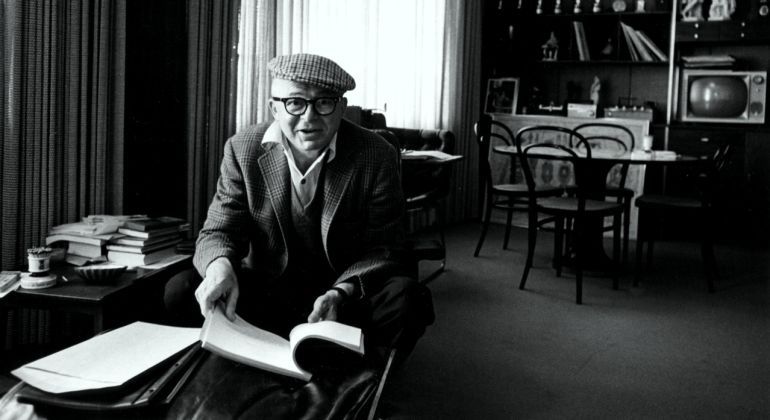
"I don't believe in God. I just believe in Billy Wilder." - Fernando Trueba
And funnily enough, I felt the exact same way about Neil Sinyard and Adrian Turner's book on Billy Wilder, 'Journey Down Sunset Boulevard' (1979) which is as close to film analysis heaven as you can ever hope to find in this life. Reading the various collected essays by Sinyard and Turner as a teenager, I found myself studying avidly the director's complete body of work without having barely seen any of his actual films. This, in turn, made me both an expert scholar on the subject of Wilder and a novice all at once but undoubtedly created an even greater anticipation and appetite to watch the films one by one and decide for myself which of them would become my favourites.
As I scandalously managed to omit any Billy Wilder film from my overall top ten films of all time, I have decided to make amends by drawing up my 'Top 10 Billy Wilder Films Of All Time (Ranked)' which have played such a huge part in influencing my creative journey so far.
One omission that may seem glaring is 'Some Like It Hot' (1959) which for some reason has never really done it for me on the Wilder metrics I live by. I'm also feeling guilty about omitting 'Witness For The Prosecution' (1957) from my list as it's increasingly grown in stature in my eyes the more I've returned to it. Aside from those missing two, there should be some familiar titles in here and some less so.
10. The Major And The Minor (1942)
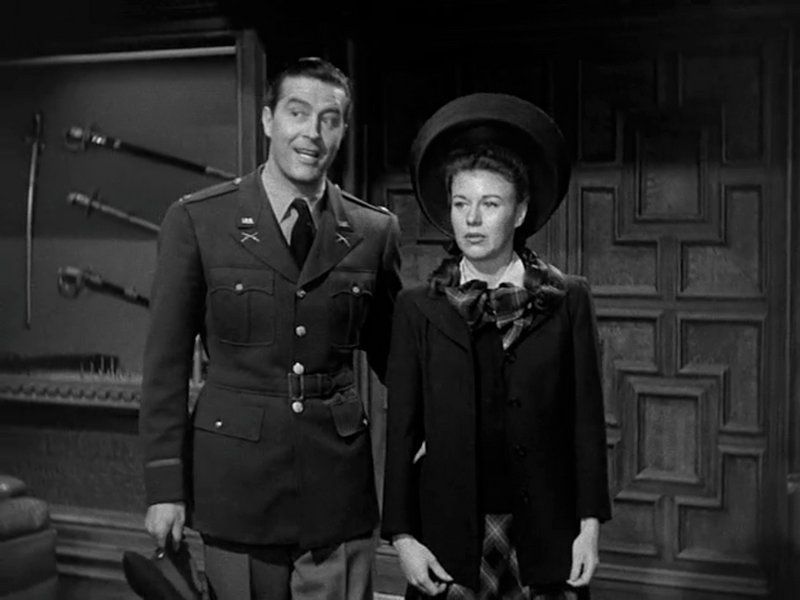
“Why don't you get out of that wet coat and into a dry martini?” - Mr. Osborne
Nabokov could have saved himself the bother of writing Lolita in 1955 and watched this hilarious debut feature of Billy Wilder's which, somehow and I'm still not quite sure how, manages to make a movie about a grown man being (sort of) infatuated with a 13-year-old girl acceptable without it being quite as weird/perverted/wrong as one might fear. In many ways 'The Major And The Minor' works as a blueprint for his later 'Some Like It Hot' (1958) with the recurring theme of masquerade evident once again in Wilder's work.
In 'The Major And The Minor" Ray Milland plays the Major of the title as he happens to meet Ginger Rogers playing 'The Minor' when in fact she's a grown woman who's pretended to be underage in order to get a discount off her train ticket home after struggling to survive in the big city.
The joy in this 1942 debut feature of Wilder is in how Milland plays his confusion with all the naivety of a young child and yet we have every reason to believe he's the 'elder' of the two main characters (at least in theory). Ginger Rogers, playing both a woman and a young girl, is hilarious and shows off the full extent of her comedic range.
A perfect debut feature for Wilder who would go on to direct another 26 features throughout his career including many classic, undisputed masterpieces.
9. Avanti (1970)
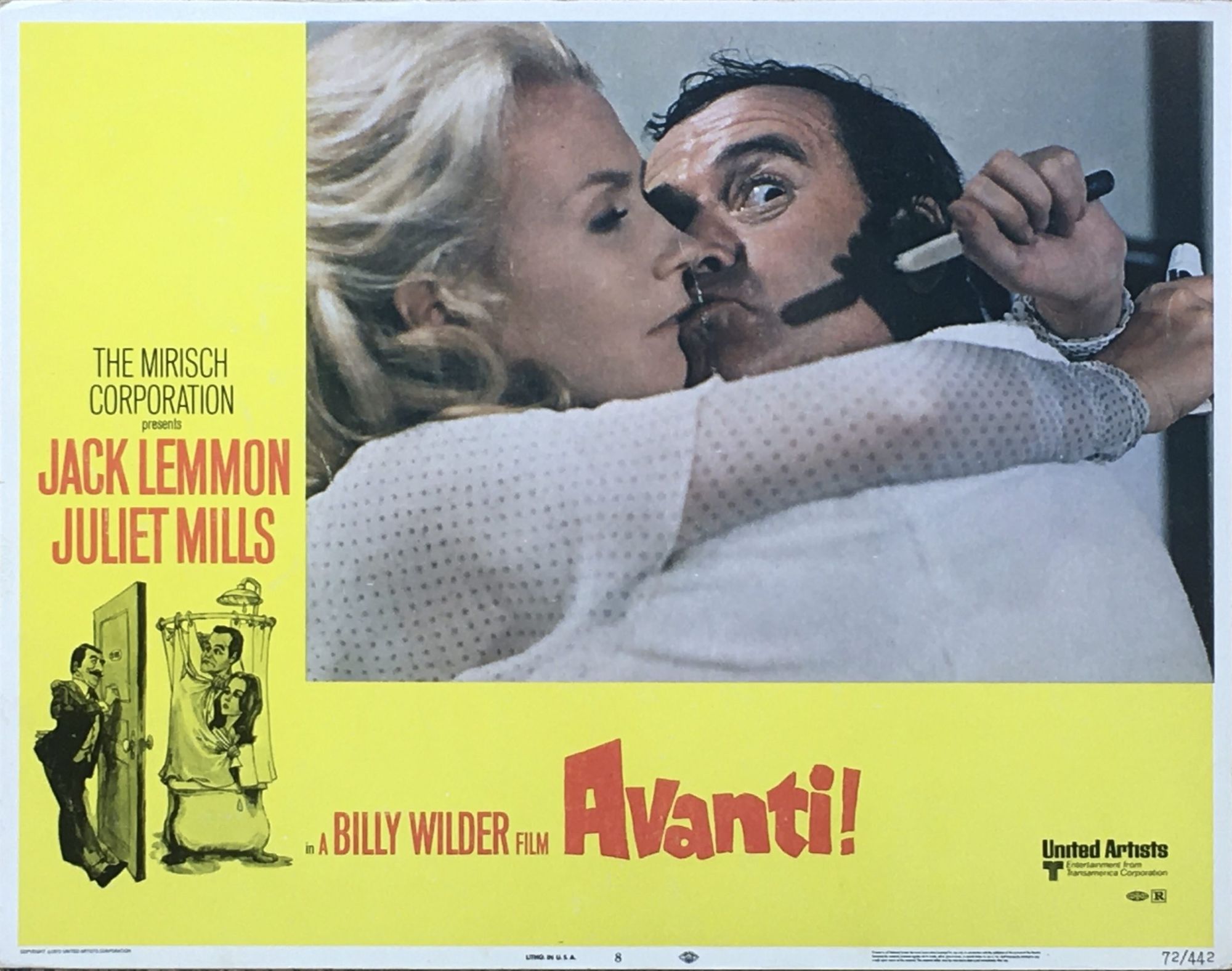
"Italy is not a country - it's an emotion." - Pamela Piggott
'Avanti' is a free holiday for a couple of hours on the Italian island of Ischia as the whole production seems to exude the Mediterranean atmosphere of its location like few other films I can think of. Only Visconti's 'The Leopard' to my mind captures the colour and warmth of Southern Italy in quite such a vivid way.
Of course, films cannot survive on mere locations alone. Or maybe they can?
The premise of 'Avanti' is fairly straightforward: American businessman, Wendell Armbruster Jr (Jack Lemmon) arrives in Italy to collect the body of his father, Armbruster Sr, who has died in a car accident. However, on arriving on the Island where the fatal crash took place, Wendell discovers that his father was not alone and died with a female passenger. The daughter of the female passenger, Pamela Piggot, has arrived from England at the exact same time as Armbruster Jr to figure out what to do next with her mother's dead body.
Both characters are chalk and cheese and typify the often strained relations between the British and the Americans. But the unlocking of this awkwardness between the two parties is in the way the Italians and their unique culture create a neutral ground where both characters can grow and understand each other better through their shared grief.
I should add an extra special mention to Carlos Rustichelli's sun-infused score which is a genuine joy and a huge asset in helping enhance the atmosphere of Billy Wilder's late, mellow, European romantic comedy classic.
8. Sabrina (1957)
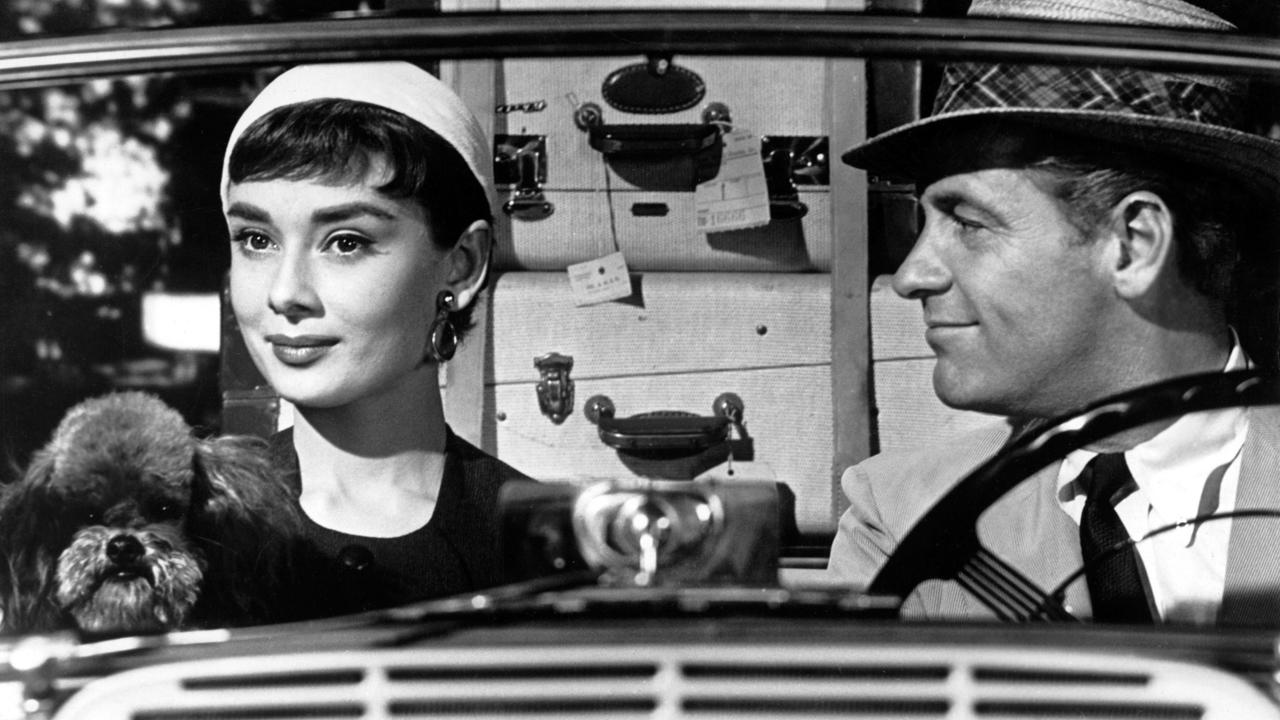
“I have learned how to live, how to be in the world and of the world, and not just to stand aside and watch. And I will never, never again run away from life." - Sabrina Fairchild
'Sabrina' is the cinematic equivalent of strawberries and champagne and even now after 65 years still has managed to keep its fizz. Of course, there's always the awkward discussion regarding the casting of Humphrey Bogart as the older brother Linus Larrabee who falls in love with the much younger Audrey Hepburn as Sabrina but he's so unassuming and charming throughout that I think we can give them a pass, eh? It's certainly not as weird as Gary Cooper courting Hepburn in Wilder's 'Love In The Afternoon' (1957) where he comes across as a stiff (pun intended) and elderly Don Juan.
A modern-day Cinderella story, expectations about who may become the Prince Charming to ultimately win Audrey's hand are wrong-footed when the younger, more handsome David Larrabee (William Holden) is out-maneuvered by his older brother Linus (Bogart).
Aside from key scenes in William Wyler's 'Roman Holiday', Audrey Hepburn has rarely been more ethereal than when wearing the Givenchy-designed Sabrina gown and drinking from a flute of champagne on the Larrabee estate's empty tennis court whilst Rogers and Hart's 'Isn't It Romantic' plays dreamily in the background on a midsummer's night.
Add to all that, Wilder's most relaxed comic romantic script and 'lightest of touches' direction and you have one dream of a movie.
Perfection.
7. Double Indemnity (1944)
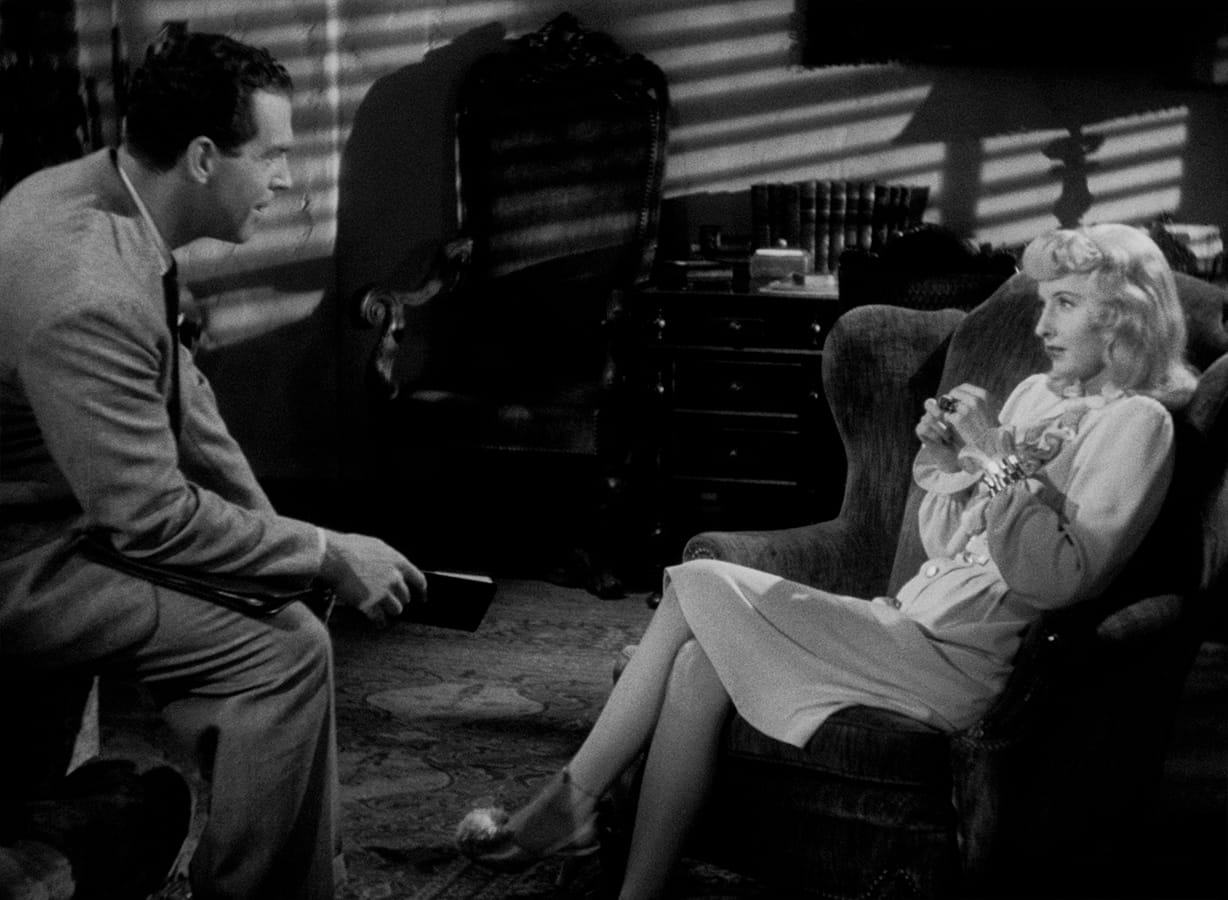
“I killed him. I killed him for money - and a woman - and I didn't get the money and I didn't get the woman.” - Walter Neff
'Double Indemnity' was the first Billy Wilder film I ever saw. My media studies teacher at A-Level College had a thing about leaving a film playing for his students while he left the room for an hour or so, returning just as the film was coming to a close only to find most of the classroom empty, except me (nerd that I was) sitting there transfixed. This was never more the case than the time he put on 'Double Indemnity' (1944) which was as dark and murderous as I'd come to expect from my limited knowledge of the film noir genre back then except with added wit and sexual chemistry between the two main leads Fred MacMurray and Barbara Stanwyck.
With a screenplay written by Wilder and Raymond Chandler, you could be forgiven for thinking this was almost a parody of the genre were it not for the fact that this is in many ways the old testament for Film Noir and one of the very first critically acclaimed examples of the form that elevated its status to a higher level.
The structure uses a flashback structure unerringly well and MacMurray's confessional voiceover to his old pay Keyes (Edward G. Robinson) provides a propulsive stress to the narrative momentum that unfolds.
With Miklós Rózsa's nervous score complimenting the thick atmosphere of murder throughout, here we have in 'Double Indemnity' the very distilled essence of film noir.
Accept no substitute.
6. One Two Three (1960)
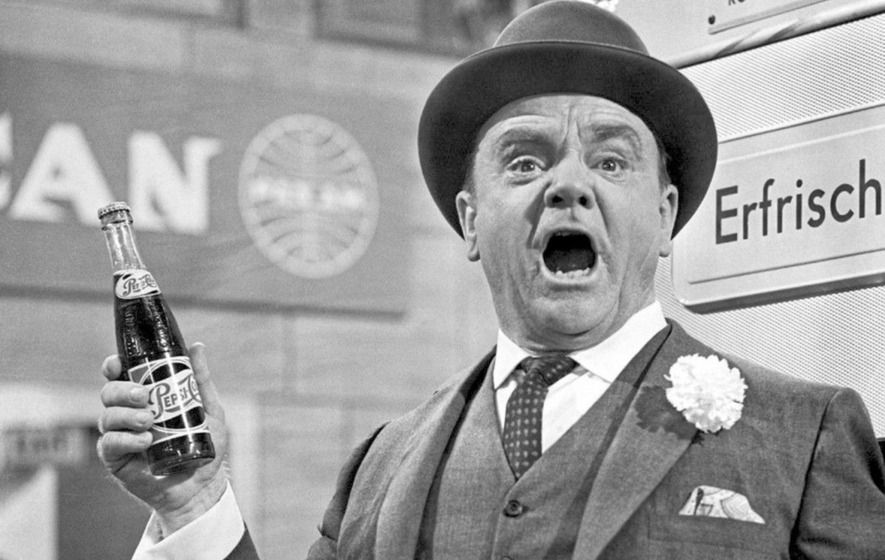
"Capitalism is like a dead herring in the moonlight. It shines, but it stinks!" - Otto
Best Cold War comedy hands down. Mind you, I'm not sure there are too many of them now I come to think about it. With James Cagney in the starring role as Coca-Cola sales executive C.R. MacNamara, how could Wilder possibly fail in achieving some level of greatness with this unique and zeitgeisty premise? In many ways I far prefer this fizzing ball of fun to Kubrick's more austere Cold War satire 'Dr Strangelove Or How I Learned To Stop Worrying And Love The Bomb' (1964) which was released four years after this madcap 1960 masterpiece from Wilder.
In fact, ten years before the iconic 'I'd Like To Buy The World A Coke' ad campaign that most people now believe Mad Men's Don Draper conceived of 'One Two Three' examined the unifying potential of capitalism by way of Coca-Coca diplomacy between West Germany and Russia during the time of fractious post-war relations. The story is set just before the construction of the Berlin Wall.
With MacNamara having to deal with the added complication of his boss's daughter getting married to a communist, his hopes of getting promoted are put in jeopardy and so has to both untangle the romantic ties and at the same time negotiate a trade deal to sell Coca-Cola to the Russians.
Not since Howard Hawks's 'His Girl Friday' has there been such a fast, speedy script, and its high strike rate of zingers must make it one of the consistently funny films of all time. There's just something irresistible about Wilder flying full pelt with such exuberant confidence with his material. It took me awhile to appreciate the greatness of 'One Two Three' but the more I go back to it, the more I love it.
5. The Private Life Of Sherlock Holmes (1971)

“Criminals are as unpredictable as head colds. You never know when you're going to catch one.” - Sherlock Holmes
Long before the numerous modern iterations deconstructing the Sherlock Holmes legend, Wilder's 'Private Life' explored the character's fallibilities and insecurities in a brilliant and nuanced way with Shakespearian actor Robert Stephens playing the title role and Colin Blakely playing the forever perpetrator of the Holmes mythos, Doctor Watson.
The structure of the film is that of a three-movement structure inspired by Miklós Rózsa's adaptation of his own violin concerto that he converted for the score to this 1971 movie.
And it's in the themes of the music that the subtext of the film is secretly both veiled and partially revealed; the one thing previously never properly explored about Holmes is his psychological relationship with women. In the lyrical 'Ilsa' theme played over the clever titles where various items belonging to Holmes are taken out of a safety deposit box somewhere in central London, we sense that this will be a romantic movie in some form or another.
It's a shame then that that 'Private Life' was intended to be even longer than its commercial release running time and includes an entire section showing how a young Holmes is humiliated by his friends at university who pay for a prostitute to pretend to be in love with him.
Nevertheless, in Ilse Von Hofmannstahl, we have a mysterious female character to rival and possibly surpass that of Irene Adler and the melancholy-infused atmosphere which pervades throughout the film comes from a sense that Holmes is incapable of finding any sort of domestic happiness outside of his bachelor-style relationship with Watson who cripples the reality of who is by the constant lionisation of his name.
One of my favorite essays of all time is by author/journalist Jonathan Coe entitled 'Detective Work' that he wrote for the Observer (30/09/2005) about the subject of 'Private Life' which I'll share the link to here - it says so much about how I feel about this lesser known, late Wilder masterpiece.
https://www.theguardian.com/film/2005/apr/30/jonathancoe.arthurconandoyle
4. Kiss Me Stupid (1964)
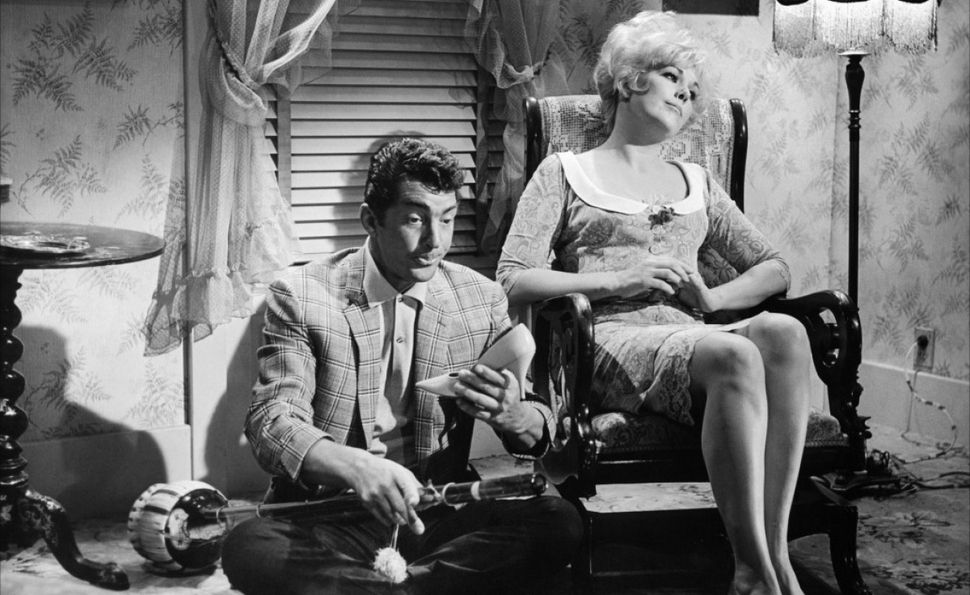
“I need another Italian song like a giraffe needs a strep throat.” - Dino
Controversial choice though this may be, I have always felt 'Kiss Me Stupid' was the perfect composite of comedy Wilder with the darker, more noirish aspects of his oeuvre.
The quickest pitch for this movie might be: a guy sells his soul for a song though in this case, it's more piano teacher/composer Orville Spooner (Ray Walston) selling his wife (Patricia Farr) for a song, which sounds awful as I write this.
Based on the 1944 play "L'ora della fantasia" ("The Dazzling Hour") by Anna Bonacci which was the most successful Italian comedy of the post-war period, "Kiss Me Stupid" was adapted by Billy Wilder and his co-writer I.A.L Diamond and set in the fictional "blink and you'll miss it" town of Climax, Nevada where truck drivers only ever stop to fill up their lighters and not even their gas tanks.
When entertainer/singer Dino (Dean Martin) takes a detour on his way from Las Vegas to Los Angeles, he ends up in Climax where he is taken care of by Orville Spooner and his lyricist partner-in-musical crime, Barney, a mechanic at the local gas station only to find vehicular problems force him to have to stay longer than he would like.
There are echoes of Mozart's "Le Nozze Di Figaro" albeit in a slightly more trashy format. In this instance, Dean Martin might be the Count and Ray Waltson Figaro and the wife is both Susanna and the Countessa combined. Orville and Barney have one night to sell their awful novelty songs to Dino before he leaves Climax, their 'town that time forgot'.
One of the most delicious features of 'Kiss Me Stupid' is the addition of Ira Gerswhin writing dummy lyrics from old discarded songs he wrote with his brother George that they never used. The irony of this poet laureate of Broadway dumbing down lyrics for some amateur songwriters is actually hilarious in its own right. "I'm A Poached Egg' and 'Sophia' could almost give 'How Much Is That Doggy In The Window' a run for its money. And this is the central point about 'Kiss Me Stupid' which is an indictment of the degrading of popular culture to its lowest common denominator, moving further away from the sophistication of the American Tin Pan Alley Songbook which is another reason why Wilder's hiring of Gershwin to be included in the music satire is so brilliant.
Further to that, Dean Martin allows himself to parody the Rat Pack culture that he was so much a part of and allows his debauched lothario persona to face a cinematic reckoning that occurs at a key moment toward the end of Act 2 of the movie.
Perhaps my favourite scene of all is when Orville Spooner plays Dino several of his songs at his piano whilst Kim Novak (impersonating Orville's wife) sits alongside him. Singing the song 'All The Live Long Day' he wrote for his actual wife for their wedding day, Dino tells the amateur songwriter that he'll buy it off him along with some of the others only for Orville to tell him earnestly: "oh, this one's not for sale" proving that there is a line where his soul cannot be bought.
A truly outrageous and controversial masterpiece that only Wilder could pull off.
He later denounced the film but we'll just assume he was upset that no-one understood it at the time. Perhaps if he was alive to read my appraisal today, he might feel better about it. ^^
3. The Apartment (1960)
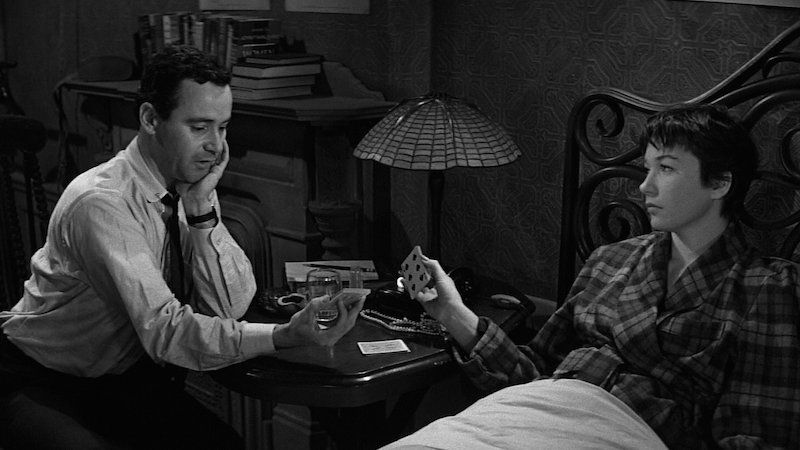
"Ya know, I used to live like Robinson Crusoe; I mean, shipwrecked among 8 million people. And then one day I saw a footprint in the sand, and there you were." - C.C Baxter
If I wasn't so conceited then I could easily have chosen 'The Apartment' as my number one choice but I am, so there it is.
Inspired by a small scene from David Lean's 'Brief Encounter' where Trevor Howard borrows a friend's apartment for the evening to spend some private time with Celia Johnson, Billy Wilder's 'The Apartment' shows the master firing on all creative cylinders.
Not only is the plot and its overall structure beat perfect, the screenplay is dazzling with its witty, poignant, multi-functional dialogue that has an almost musical leitmotif quality to it. Repetitions of key lines and phrases over the two-hour running time bring extra pathos to the twisted romantic comedy that shows C.C Baxter (Jack Lemmon) pimping out his apartment for executives at his workplace who rank in seniority above him. It's only when he falls in love with an elevator girl (Shirley MacLaine) that things start to get increasingly complicated as she is involved with the head CEO of the company in a secret affair.
The Kafka-esque workplace environment that has men and women working like rows of ants is contrasted beautifully with the cosiness of Baxter's apartment which he is constantly turfed out of by horny executives who bring their secret girlfriends there to have sex with.
Rarely has there been better scenes of insomnia than those of C.C Baxter wandering the streets of New York in the wee small hours and finally ending up on a park bench until having to start all over again at work on barely any sleep.
Similar to 'Kiss Me Stupid', the pressing question throughout the film's story is how much bribery can Baxter take until he finds a backbone and recovers some pride and self-respect outside of the teasing promises of promotion his bosses dangle like a carrot in exchange for his soul.
And not only does Baxter have to be tested on this moral criteria but his romantic counterpart, Fran Kubelik (MacLaine), also which is why their eventual coming together in the final reel is ultimately inevitable.
2. Sunset Boulevard (1950)
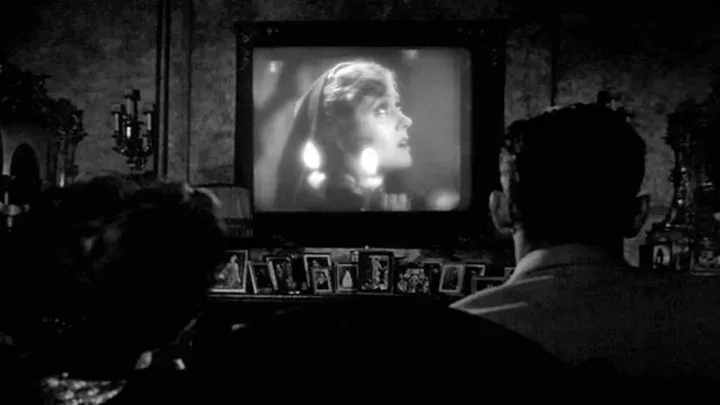
"Audiences don't know somebody sits down and writes a picture; they think the actors make it up as they go along.” - Joe Gillis
The film that made me decide (for better or for worse) to try and become a screenwriter. Something about watching William Holden struggling in a beat-up apartment in Los Angeles bashing out short stories on poverty row must have inspired me to repeat the same trick and so, now, here I am - the Cotswold version of Joe Gillis yet with no swimming pool to my name. Perhaps there's still time for me to find my Gloria Swanson Hollywood patron yet. Or maybe I should continue to heed the cautionary tale of 'Sunset Boulevard' where personal ambition can lead you to dark places.
Watching 'Sunset' in 2023 what strikes you is the modern feel to its satire of the film industry that could be just as easily true today as it was back in 1950 when it first premiered. Apart from Preston Sturges's 'Sullivan's Travels', I can't think of a more fully encompassing expose of the studio machine back at that time in movie history.
Watching Joe Gillis become ensnared in the spider web of a forgotten movie star in her faded mansion thinking it will be his golden ticket, not realising it will lead to his grim downfall is such a brilliant premise and says everything about the seductive dream of Hollywood that so many people (including me) have naively chased without realising its darker side. I love William Holden's performance in this movie so much as I do Gloria Swanson playing Norma Desmond and Erich Von Stroheim as her ex-husband turned man-servant; it demonstrates to full effect how Wilder chooses only the best actors to deliver his word-perfect screenplays and follow his expert direction.
1. Ace In The Hole (1951)
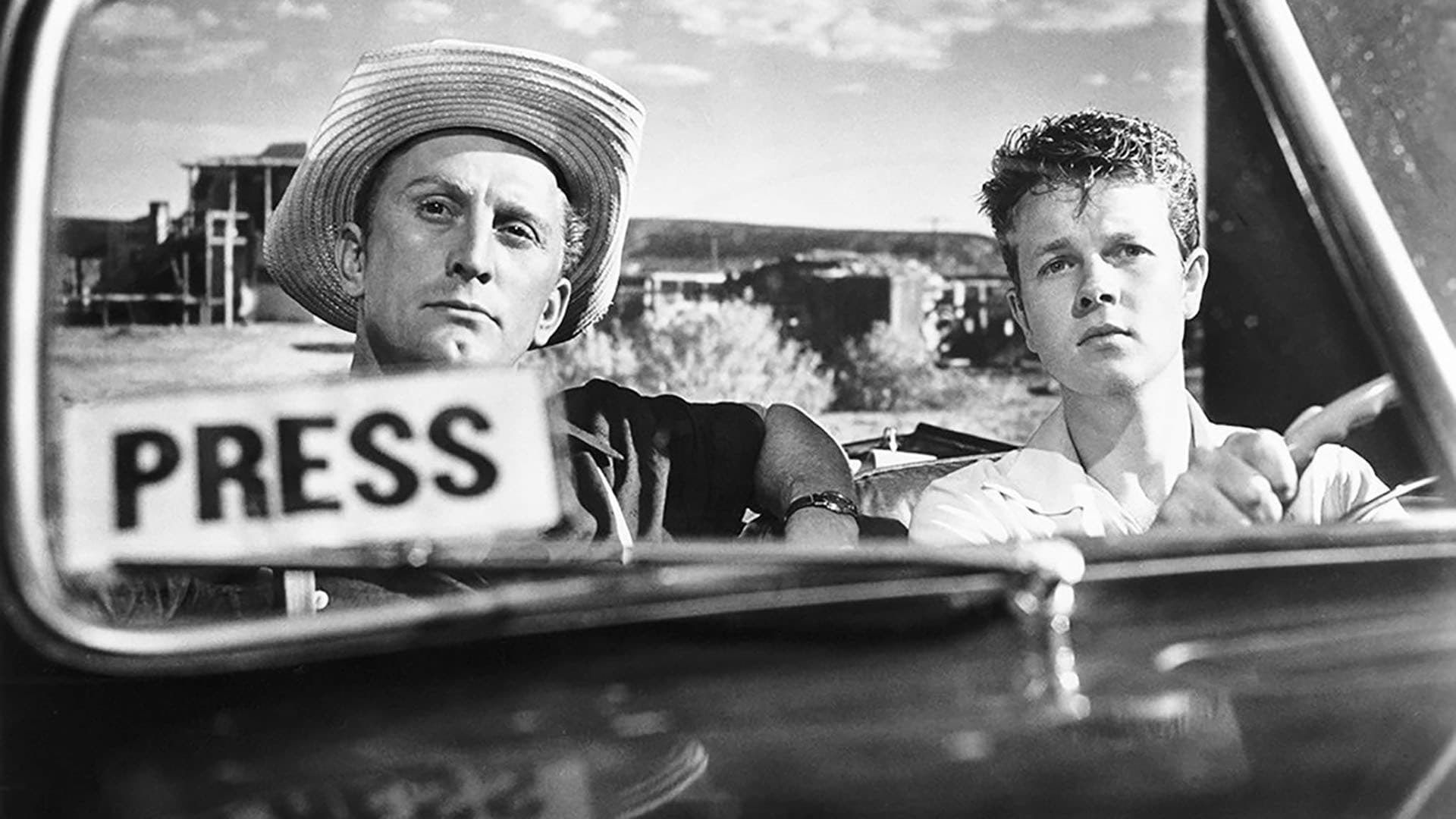
"I can handle big news and little news. And if there's no news, I'll go out and bite a dog." - Chuck Tatum
This movie is like cinematic dynamite which seems an especially appropriate analogy as the story centres around a man trapped inside a giant rock desperate to break out. If Hitchcock's 'Rear Window' was the director's statement about the nature of voyeurism and film audiences, then 'Ace In The Hole' was Wilder's own attack on the general public's ghoulish and insatiable lust for a human interest story that lasts as long as it circumstances allow it to be eked out by the vulture press.
Has there ever been a more morally bankrupt yet utterly mesmerizing depiction of a shameless newsman than that of Kirk Douglas's Chuck Tatum? One wonders what would happen if J.J Hunsecker (Burt Lancaster) from 'Sweet Smell Of Success' were ever to meet and team up with him. God forbid.
Loosely based on the true story of Floyd Collins, a spelunker who got himself stuck in a Kentucky cave in 1925 creating hysterical media coverage for nearly two weeks while he remained trapped inside it, 'Ace In The Hole' manages to ramp up the insanity of what happened in reality to extreme, almost surreal levels of satire that never feels too far beyond the realm of truth.
What Wilder does with this acid-laced masterpiece that followed 'Sunset Boulevard' is holding a mirror up to the world, showing the hypocrisy of human beings with all our secret guilty pleasures in enjoying the suffering of others' personal tragedies.
The reason I have chosen 'Ace' as my number one on the list is because it is the most direct, fully charged dose of Wilder of all my top ten, and when I need reminding of how to construct a narrative with zero compromise and revel in your characters purpose (be it good or evil) then this is one of the greatest examples of cinematic storytelling at its purest and most laser focused.
And Chuck Tatum (for all his awfulness) is one of the most mesmerizing anti-heroes ever devised. I defy anyone to try taking their eyes off this absolute mad man as he plots his revenge against his old employers from New York's Newspaper Row.